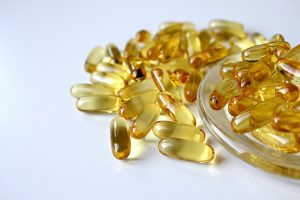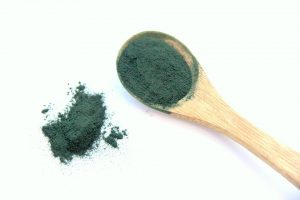We mostly think of fats as bad for our health, but there are certain kinds that are essential for our bodies. Omega 3 fatty acids fall into that essential fat category. But why are omega 3 fatty acids important?

There has been plenty of research on the benefits of omega 3 fatty acids that prove their importance in our lives. For plant-based eaters, this is all the more important because the majority of these come from animal sources. So they have to go a step ahead and ensure that they are getting an ample amount of these fats to stay healthy.
Fatty fish like mackerel, seabass, and salmon are excellent sources of omega 3 fatty acids. But what do you do if you’re a vegan or want to get it through plant-based sources? Well, there are plenty of vegan options out there as well.
What are Omega 3 Fatty Acids?
Omega 3s are a kind of fatty acid that our body does not produce on its own and must be supplied through food or supplements.
There are three main types of omega 3 fatty acids:
- ALA
- DHA
- EPA
ALA
ALA or alpha-linolenic acid is the most common out of these three omega 3 fatty acids. While its main purpose is providing energy, it can also be converted into the other two kinds.
Most of the ALA is used for energy, and only a small amount is converted into DHA or EPA. So ALA alone cannot make up for the other two.
ALA is mostly found in plant sources, but also some animal sources.
DHA
DHA or docosahexaenoic acid is a key component for several of our body parts. It’s found in the brain and retina. It’s mainly found in animal products.
EPA
Like DHA, EPA or eicosapentaenoic acid is most common in animal products like fatty fish. However, it’s also found in some microorganisms, which are used to make supplements for this particular kind of omega 3.

EPA can be converted into DHA, but only partially. Both EPA and DHA are long-chain fatty acids.
Why are Omega 3 Fatty Acids Important?
There are many reasons why health experts recommend eating foods rich in omega 3 fatty acids and taking supplements when you’re deficient in them.
Some may argue the long-chain EPA and DHA are even more important. Here are some reasons why these nutrients are so vital for us:
Good for Eye Health
As mentioned earlier, omega 3 fatty acids, particularly DHA, are good for your eyes. DHA is a structural part of the retina. There’s as much as 60 percent DHA in the retina of your eye.
Those who don’t get enough DHA through diet may develop vision issues. Research shows that omega 3 fatty acids can help prevent macular degeneration, which causes permanent eye damage and blindness.
Important for Pregnant Women
Omega 3s are important for all adults, but for pregnant women, they may be even more important. Why?

DHA can promote brain and visual development in babies. One 2013 Food and Function review study found that adding DHA to baby formula resulted in better eyesight. Similarly, if the mother has enough omega 3 acids, the child could have more intelligence and fewer mental or behavioral issues.
There are many studies that have explored the effects of DHA in pregnant women and the outcome of it in their children.
Lowers Risk of Cardiovascular Disease
This is one of the reasons why a Mediterranean diet is considered healthy, as it’s rich in omega 3 fatty acids. When researchers looked at why people in the region generally had healthier hearts, they found omega 3 fatty acids to be part of the reason.
While the omega 3s in the Mediterranean diet mainly come from fish, the plant-based omega 3s are equally good for your heart health. In fact, they can lower the risk of heart diseases.
Omega 3s target triglycerides in your blood, which are a risk factor for a number of heart conditions. An HIV-related clinical trial study looking at the effects of omega 3 fatty acids on HIV-positive patients with hypertriglyceridemia found that they significantly reduced the level of triglycerides.
They don’t just reduce one risk factor but many. Omega 3s may help regulate blood pressure, prevent the formation of clots, and raise HDL levels (good cholesterol). As a result, those who consume ample omega 3 fatty acids have far fewer risk factors for heart disease.
Omega 3s also prevent plaque in arteries, reducing the risk of coronary artery disease.
Helps Treat Depression
These fatty acids are essential for our brain and may immensely help people with depression or even anxiety issues. According to a study in European Neuropsychopharmacology, those with depression who took omega 3 supplements found an improvement in their symptoms.
Out of the three omega 3 fatty acids, EPA is the most effective in suppressing symptoms of depression. So much so that it can be equally effective as an anti-depressant drug.
Reduces Inflammation
Inflammation occurs as a result of your immune system’s response. However, in autoimmune diseases like arthritis, it can occur on its own without any reason.
Omega 3 fatty acids reduce the production of certain substances in the body that have been linked to inflammation. These substances are cytokines and acid-derived eicosanoids.
Many studies have found these fatty nutrients to be anti-inflammatory. This another way they reduce the risk of heart disease, as long-term inflammation can increase the likelihood of heart disease and cancer.
In addition to fighting inflammation, these fatty acids can also help with other autoimmune diseases, such as type I diabetes and multiple sclerosis.
Fights Cognitive Decline
Mental decline is natural as we age, but it shouldn’t be so severe. Dementia and Alzheimer’s disease are a direct result of cognitive decline. One study found that long-chain omega 3 acids can reduce the risk of Alzheimer’s disease.
Not just reduce the risk, they may even help reduce the severity of the disease. They can benefit from EPA, in particular.
There’s still ongoing research on AD as we still don’t have a complete cure for the disease or fully understand how it’s caused. However, this much is clear that omega 3s are good for brain health.
Cancer Prevention
Omega 3 fatty acids are also good for cancer prevention as many research studies have proven. The effect may vary depending on cancer, as there are so many different types out there.
An American Journal of Epidemiology found that omega 3 acids can reduce the risk of colorectal cancer by as much as 55 percent. Similarly, they may also prevent breast cancer and prostate cancer.
Controls ADHD Symptoms
Some studies indicate that children with attention deficit hyperactivity disorder (ADHD) have lower levels of omega 3 fatty acids.

They can help reduce the symptoms of ADHD, including impulsiveness, hyperactivity, aggression, and restlessness. This could be great for parents who struggle with the behavior of their child with ADHD and resort to medications and therapy.
While some consider fish oil to be a good supplement, but its health hazards don’t make it viable for children or even adults, for that matter.
Better Sleep
Believe it or not, sleep is linked with health problems in many ways. Sleep deprivation can result from both mental and physical conditions. But as it turns out, omega 3s are good for sleep.
In both children and adults, sleep deprivation has been linked to low levels of omega 3s. So you can guess that adequate levels will help improve sleep quality. Studies back this as well, with evidence showing improvement in sleep quality after using omega 3 fatty acid supplements.
Good Skin
If you’ve seen omega 3 fatty acids listed as part of the ingredients of skin care products, don’t be so surprised. It’s actually good for your skin because these substances form the basic structural component of skin cells.
EPA promotes a healthy cell membrane, which results in soft and wrinkle-free skin. That’s not all, they also benefit your skin by hydrating and reducing or slowing down aging. It also reduces the risk of acne and helps manages outbreaks if you suffer from it.
Plant-based Sources of Omega 3 Fatty Acids (500)
Now that you understand why are omega 3 fatty acids important, you should also consider the foods that can give you more of them. It’s a common misconception that omega 3s only come from fish, but there’s a wide range of plant-based sources as well.
Chia Seeds
Chia seeds aren’t just a good source of fiber and protein, they also contain a lot of ALA omega 3 fatty acid. One ounce of chia seeds gives you 5.05 g of ALA.

You can add them to your oatmeal or other breakfast cereals. There are also some dessert recipes out there that use chia seeds, including chia seeds pudding.
Flaxseeds
Flaxseeds can be consumed in a lot of ways and provide a host of benefits, one of which is omega 3 fatty acids. In addition to that, these also provide a healthy dose of fiber and magnesium.
Just one tablespoon of flaxseeds can provide you with as much as 6.7 g of ALA. You can also use flaxseeds with water as an egg replacement in dishes that call for egg whites.
Seaweed
Seaweed can provide you with DHA and EPA, which most plant-based sources with ALA don’t have. It’s available as nori and chips. Chips are a better way to get the omega-3 fatty acids, as they are available widely.
Seaweed can also provide you with vitamin B12, which is a good alternative to supplements.
Spirulina
Spirulina, which is a kind of cyanobacteria found in water, is another great vegan source of omega 3 fatty acids. It comes in the form of powder or tablets that you can add to juices or smoothies.

It has many health benefits which overlap with the benefits of omega 3 fatty acids. These include reducing bad cholesterol and inflammation.
Walnuts
Did you know that walnuts contain 3.34 g per cup? It’s no surprise as walnuts are known for their benefits for the brain. They contain healthy fats that don’t cause health problems as other fats found in animal products and processed foods do.
You can add them into breakfast cereals, use them in desserts, or simply snack on them. However, make sure to keep the quantity in check as they are a high caloric density food.
Kidney Beans
While kidney beans don’t contain a lot of it, they still can provide enough ALA to meet your needs (200 mg per cup). The good thing is that when you’re on a plant-based diet, you’ll consume a lot of beans, including kidney beans so you will get your fix of ALA, at least.
Edamame
Edamame, which is basically immature soybeans, provides as much as 200 mg of ALA per half-cup. They are also rich in protein, so you’ll also get enough plant-based protein to meet your daily protein intake requirements. They are most popular as a side dish, and you can even find edamame snacks.
Wrap Up
Omega 3 fatty acids have a wide array of benefits, from improving brain health to preventing heart disease and cancer. For those eating whole-food plant-based foods, making sure they get their omega 3s is important, especially the long-chain DHA and EPA. You can get them through seaweed and spirulina. Whereas ALA is easily available in many vegan foods.
A deficiency in any of the three omega 3s can lead to health issues such as cognitive decline and inflammation. So make sure to include the above foods in your weekly meals and snacks.











